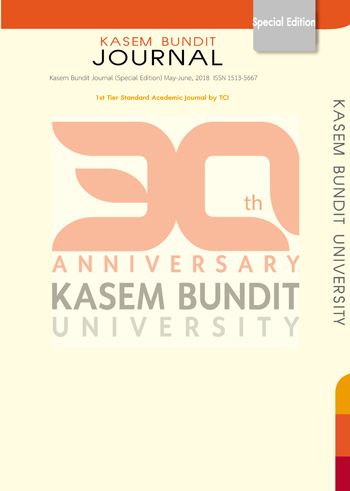Building Good Management Practices in Thailand Cooperative Sectors through Total Quality Management (TQM)
Keywords:
business competitiveness, developing Co-Op, developed Co-Op, good practices, self-assessment evaluationAbstract
In Thailand, Co-Op sectors are a novel business over other sectors depending on the needs of society, culture, and friendly communities. The objective of this investigation was to validate the overall business performances of Co-Op sectors in Thailand to promote the competitiveness of this sector. The key performance indices relating to total quality management (TQM) with 9 major criteria were validated on two groups of Co-Op population, and the score was analyzed in each criterion. In addition, the relationships between those criteria of TQM were created as a performance excellence framework of Co-Op sectors. Developed Co-Op establishing the novel mind-set in a business results as a final goal was archived and strongly improved in all criteria of TQM better than developing Co-Op. Logistic and inventory management, business management, and supply chain, as well as safety, risk assessment and environment were defined as key successes for Co-Op business results with high correlation coefficient (r2 >0.89). In conclusion, the Co-Op competitiveness needs to provide the TQM, especially good practices in business management.
References
[2] Gupta, C. (2014) The co-operative model as a ‘living experiment in democracy’. Journal of Co-operative Organization and Management, 2, 98-107.
[3] Kasachat, W., & Chimkul, K. (2009) Performance measurement of agricultural cooperatives in Thailand: An accounting-based data envelopment analysis. In Lee, J.D., & Heshmati (eds.), Productivity, Efficiency and Economic Growth in the Asia-Pacific Region. Springer-Verlag Berlin Heidelberg, pp. 255-266.
[4] Chieochan, O., Lindley, D., & Dunn, T. (2000) Factor affecting the use of information technology in Thai agricultural co-operative: A work in progress. The Electronic Journal on Information Systems in Developing Countries, 2, 1-15.
[5] Benson, T. (2014) Building good management practices in Ethiopian agricultural cooperatives through regular financial audits. Journal of Co-operative Organization and Management, 2, 72-82.
[6] Galor, Z. (2014) The cooperative components of the classic Moshav. Journal of Co-operative Organization and Management, 2, 83-91.
[7] Cook, M.L., & Ilopoulos, C. (2016) Generic solutions to coordination and organizational costs: Informing cooperative longevity. Journal on Chain and Network Science, 16, 19-27.
[8] Iliopoulos, C. (2013) Public policy support for agricultural cooperatives: An organizational economics approach. Annals of Public and Cooperative Economics, 84, 241-252.
[9] Iliopoulos, C. (2014) Ownership, governance and related trade-offs in agricultural cooperatives. Dovenschmidt Quarterly, 4, 60-80.
[10] Cook, M.L. & Burress, M.J. (2009) A cooperative life cycle framework. In: International Conference Rural Cooperation in the 21st Century: Lessons from the Past, Pathways to the Future, June, 2009. p. 15-17.
[11] Suwandee, S., Krittanathip, V., Ratanamaneechat, C., Rakkarn, S., & Cha-um, S. (2013) Creativity, innovation and development of novel products in cooperative sector in Thailand. Procedia-Social and Behavioral Sciences, 88, 28-36.
[12] Franken, J.R.V., & Cook, M.L. (2015) Informing measurement of cooperative performance. Interfirm Networks, Springer International Publishing, 2015. 209-226.
Downloads
Published
How to Cite
Issue
Section
License
ทัศนคติ ความคิดเห็นใด ๆ ที่ปรากฏในวารสารเกษมบัณฑิตฉบับนี้เป็นของผู้เขียน โดยเฉพาะ มหาวิทยาลัยเกษมบัณฑิตและบรรณาธิการ ไม่จำเป็นต้องมีความเห็นพ้องด้วย







